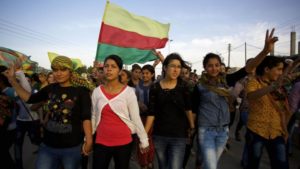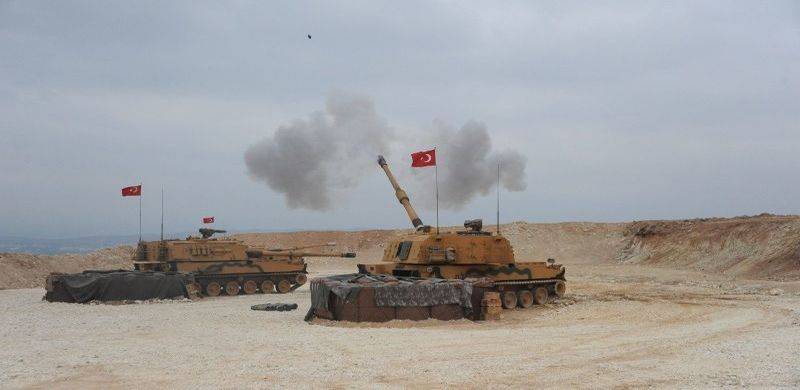
Around 100,000 people have fled their homes in northern Syria following an offensive by Turkish military forces. The Turkish attack occurred just three days after United States President Donald Trump ordered US troops to withdraw from northern Syria.
The Turkish operation began with artillery and airstrikes on October 9, which were followed by an incursion into Syrian territory by Turkish ground troops. Mayhem was witnessed in the border towns of northern Syria as people fled towards the south and into neighbouring Iraq.
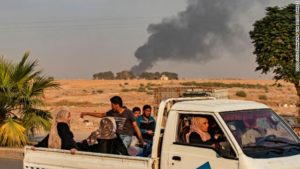
According to the Syrian Observatory of Human Rights, more than a 100 people have been killed in the attack, with the dead mostly including civilians in Syrian territory. Videos shared on social media showed buildings on fire and people desperately trying to help the injured lying on the streets.
https://twitter.com/Adel99309311/status/1181995333179645952?s=20
A video doing the rounds on social media purportedly showed the aftermath of a Turkish attack in northern Syria. Warning: Graphic Footage.
https://twitter.com/mhamadmahmud10/status/1182737140251267073?s=20
Turkey has said that it is carrying out the operation against the Syrian Democratic Forces (SDF). According to Aljazeera, Turkey intends to expel SDF from parts of northern Syria as it sees the group as a terrorist organisation.
Moreover, Turkey intends to create a ‘safe zone’ where it can resettle the 3.6 million Syrian refugees currently present inside Turkey. In the map below, the region controlled by SDF is shown in green, with a strip of land shown in the north which Turkey intends to capture in order to create a ‘safe zone’.
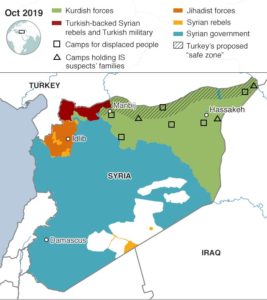
Who are the Syrian Democratic Forces?
The SDF is an alliance comprising mostly of Kurdish and Arab fighters. In 2011, amidst the background of the Syrian Civil War, there was a Kurdish uprising in parts of North and East Syria. Meanwhile, forces belonging to Syrian president Bashar al-Assad withdrew from the region to focus on the more important battles occurring in western Syria near Damascus and Allepo.
As Syrian government forces withdrew, Kurdish political parties led by the Democratic Union Party formed a council to govern Kurdish territory. The parties established a militia of Kurdish fighters called the People’s Protection Unit (YPG) to protect Kurdish territory in northern Syria. According to an article in globalsecurity.org, as the YPG militarily secured Kurdish territory, the region gained de facto autonomy in 2012.
According to an article in Washington Post, the YPG joined with other Arab militias to form the Syrian Democratic Forces in 2015. The SDF has, over the years, received training and weaponry from the United States, France, and Britain.
In 2016, according to reports in Arab media, the region under control of Kurdish parties and the SDF adopted a constitution for itself. The region – shown in green in the map above - came to be referred as the Autonomous Administration of North and East Syria (NES), and the constitution declared the SDF as its official military force. The region is, however, neither recognised by the Assad government, nor by any international country.
According to a report in BBC, the region is governed on secular and progressive principles. The NES aspires to be a democratic entity, with a focus on religious tolerance, cultural and political diversity and gender equality. Because the region’s government and armed forces are primarily led by the Kurds, the region can be considered a defacto Kurdish state. In Arab media, the region is often referred to as Rojava, and among Kurdish nationalists, as Western Kurdistan.
The SDF is known primarily for its fight against the Islamic State of Iraq and Syria and is credited with expelling the extremist militant group from the northern region of Syria. The YPG and SDF are also famous for employing women in front line combat.
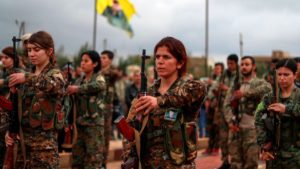
What does Turkey have against the Kurds?
Turkey has for decades been plagued by attacks carried out by a militant political organisation called the Kurdistan Workers Party (PKK). The PKK originally aimed for an independent Kurdish state, but later changed its goals to increased rights and autonomy for Kurds in Syria, Turkey, Iraq and Iran. According to a report in BBC, one of the reasons for the formation of the group was the oppression of Kurds in Turkey, and the group has been in conflict with the Turkish state since 1984.
Turkish President Tayyip Erdogan views the Syrian Democratic Forces in northern Syria, and primarily the YPG, as having links with the Kurdistan Workers Party, which it considers a terrorist organisation.
Turkey has stated that its current military operation in northern Syria against the SDF is aimed at neutralising ‘terrorist’ activity near its southern border.
A report in Washington Post cited a senior fellow of the Brookings Institution, Omar Taspinar, as saying that for Turkey, countering the PKK is a more pressing issue than fighting the Islamic State.
Taspinar added that Turkey’s plans to resettle Syrian refugees in a ‘safe zone’ in northern Syria was rather an attempt to create a ‘buffer zone’ between Kurdish fighters and Turkey.
Considering the aforementioned view, the move is seemingly a tactic to deal with a longstanding issue rather than one motivated by humanitarian concerns.
World reaction to the invasion:
The government of Syria, though not allied with the SDF, has condemned the Turkish attack, calling it a breach of international law and Syrian sovereignty. The attack has also received condemnation from Turkey’s neighbours, Iran and Iraq, who both have a population of Kurds living within their territory.
Moreover, India and Saudi Arabia have also opposed Turkey’s invasion. Pakistan has supported the move, and the Pakistani Foreign Office issued a statement which recognised Turkey’s ‘legitimate security concerns’ and acknowledged its ‘humanitarian efforts’ to host Syrian refugees.
The attack has received criticism from France and Germany, both of whom are members of NATO, which Turkey is also a part of. Both European states have argued that the attack would destabilise the region and would allow ISIS to return, while Germany has also banned weapon exports to Turkey. Sweden and Finland have denounced the invasion and Norway has suspended arms sales to Turkey.
Meanwhile, Kurds around the world are protesting against Turkish action in northern Syria. Reportedly, 10,000 Kurds took to the streets in Stockholm to protest against the invasion.
https://twitter.com/realrojkom/status/1182997733990375424?s=20
The United States, which is being seen as having given Turkey a free hand with its troop withdrawal in northern Syria, has given a lukewarm response to the attack, with US President Donald Trump calling the attack ‘a bad idea’.
The United Nations Security Council on Thursday held an emergency closed-door session regarding the matter but failed to arrive at a statement condemning Turkey’s military operation in Syria. The US Ambassador to the United Nations, Kelly Craft, stated that the United States does not endorse Turkey’s actions. However, she did not issue a categorical statement of condemnation.
https://twitter.com/PamelaFalk/status/1182356597995122691?s=20
The Turkish operation began with artillery and airstrikes on October 9, which were followed by an incursion into Syrian territory by Turkish ground troops. Mayhem was witnessed in the border towns of northern Syria as people fled towards the south and into neighbouring Iraq.

Civilians in northern Syria fleeing their hometowns
According to the Syrian Observatory of Human Rights, more than a 100 people have been killed in the attack, with the dead mostly including civilians in Syrian territory. Videos shared on social media showed buildings on fire and people desperately trying to help the injured lying on the streets.
https://twitter.com/Adel99309311/status/1181995333179645952?s=20
A video doing the rounds on social media purportedly showed the aftermath of a Turkish attack in northern Syria. Warning: Graphic Footage.
https://twitter.com/mhamadmahmud10/status/1182737140251267073?s=20
Turkey has said that it is carrying out the operation against the Syrian Democratic Forces (SDF). According to Aljazeera, Turkey intends to expel SDF from parts of northern Syria as it sees the group as a terrorist organisation.
Moreover, Turkey intends to create a ‘safe zone’ where it can resettle the 3.6 million Syrian refugees currently present inside Turkey. In the map below, the region controlled by SDF is shown in green, with a strip of land shown in the north which Turkey intends to capture in order to create a ‘safe zone’.

Source: Conflict Monitor From IHS Markit
Who are the Syrian Democratic Forces?
The SDF is an alliance comprising mostly of Kurdish and Arab fighters. In 2011, amidst the background of the Syrian Civil War, there was a Kurdish uprising in parts of North and East Syria. Meanwhile, forces belonging to Syrian president Bashar al-Assad withdrew from the region to focus on the more important battles occurring in western Syria near Damascus and Allepo.
As Syrian government forces withdrew, Kurdish political parties led by the Democratic Union Party formed a council to govern Kurdish territory. The parties established a militia of Kurdish fighters called the People’s Protection Unit (YPG) to protect Kurdish territory in northern Syria. According to an article in globalsecurity.org, as the YPG militarily secured Kurdish territory, the region gained de facto autonomy in 2012.
According to an article in Washington Post, the YPG joined with other Arab militias to form the Syrian Democratic Forces in 2015. The SDF has, over the years, received training and weaponry from the United States, France, and Britain.
In 2016, according to reports in Arab media, the region under control of Kurdish parties and the SDF adopted a constitution for itself. The region – shown in green in the map above - came to be referred as the Autonomous Administration of North and East Syria (NES), and the constitution declared the SDF as its official military force. The region is, however, neither recognised by the Assad government, nor by any international country.
According to a report in BBC, the region is governed on secular and progressive principles. The NES aspires to be a democratic entity, with a focus on religious tolerance, cultural and political diversity and gender equality. Because the region’s government and armed forces are primarily led by the Kurds, the region can be considered a defacto Kurdish state. In Arab media, the region is often referred to as Rojava, and among Kurdish nationalists, as Western Kurdistan.
The SDF is known primarily for its fight against the Islamic State of Iraq and Syria and is credited with expelling the extremist militant group from the northern region of Syria. The YPG and SDF are also famous for employing women in front line combat.

Women fighters of the YPG
What does Turkey have against the Kurds?
Turkey has for decades been plagued by attacks carried out by a militant political organisation called the Kurdistan Workers Party (PKK). The PKK originally aimed for an independent Kurdish state, but later changed its goals to increased rights and autonomy for Kurds in Syria, Turkey, Iraq and Iran. According to a report in BBC, one of the reasons for the formation of the group was the oppression of Kurds in Turkey, and the group has been in conflict with the Turkish state since 1984.
Turkish President Tayyip Erdogan views the Syrian Democratic Forces in northern Syria, and primarily the YPG, as having links with the Kurdistan Workers Party, which it considers a terrorist organisation.
Turkey has stated that its current military operation in northern Syria against the SDF is aimed at neutralising ‘terrorist’ activity near its southern border.
A report in Washington Post cited a senior fellow of the Brookings Institution, Omar Taspinar, as saying that for Turkey, countering the PKK is a more pressing issue than fighting the Islamic State.
Taspinar added that Turkey’s plans to resettle Syrian refugees in a ‘safe zone’ in northern Syria was rather an attempt to create a ‘buffer zone’ between Kurdish fighters and Turkey.
Considering the aforementioned view, the move is seemingly a tactic to deal with a longstanding issue rather than one motivated by humanitarian concerns.
World reaction to the invasion:
The government of Syria, though not allied with the SDF, has condemned the Turkish attack, calling it a breach of international law and Syrian sovereignty. The attack has also received condemnation from Turkey’s neighbours, Iran and Iraq, who both have a population of Kurds living within their territory.
Moreover, India and Saudi Arabia have also opposed Turkey’s invasion. Pakistan has supported the move, and the Pakistani Foreign Office issued a statement which recognised Turkey’s ‘legitimate security concerns’ and acknowledged its ‘humanitarian efforts’ to host Syrian refugees.
The attack has received criticism from France and Germany, both of whom are members of NATO, which Turkey is also a part of. Both European states have argued that the attack would destabilise the region and would allow ISIS to return, while Germany has also banned weapon exports to Turkey. Sweden and Finland have denounced the invasion and Norway has suspended arms sales to Turkey.
Meanwhile, Kurds around the world are protesting against Turkish action in northern Syria. Reportedly, 10,000 Kurds took to the streets in Stockholm to protest against the invasion.
https://twitter.com/realrojkom/status/1182997733990375424?s=20
The United States, which is being seen as having given Turkey a free hand with its troop withdrawal in northern Syria, has given a lukewarm response to the attack, with US President Donald Trump calling the attack ‘a bad idea’.
The United Nations Security Council on Thursday held an emergency closed-door session regarding the matter but failed to arrive at a statement condemning Turkey’s military operation in Syria. The US Ambassador to the United Nations, Kelly Craft, stated that the United States does not endorse Turkey’s actions. However, she did not issue a categorical statement of condemnation.
https://twitter.com/PamelaFalk/status/1182356597995122691?s=20

